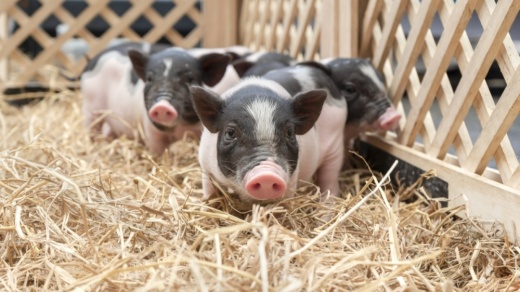McKinney City Council heard a presentation from Kerry Simpson, the city’s director of code services, during a work session Nov. 16 on how the city could go about regulating pet pigs if the city decided to allow them.
Cities such as Allen, Frisco and Plano do not allow potbellied pigs, Simpson told council during her presentation. Belton, Carrollton, Wylie and Garland allow up to two pigs with varying weight restrictions, Simpson said.
She proposed the city of McKinney allow one miniature swine under 150 pounds per single-family residence. These pets would not be allowed in multifamily residences, however. Other restrictions could be applied, such as spaying and neutering requirements, vaccinations, sanitary conditions, and microchips or national registration requirements, according to the presentation.
The discussion was initiated after an Oct. 19 City Council meeting when McKinney resident Bridgett White requested the city reconsider its zoning ordinance to allow potbellied pigs as pets.
“I am speaking not only for myself and my family but for the other potbellied pig parents in McKinney,” White said during the meeting. “Potbellied pigs are domesticated pets. They’re not livestock. ... The [U.S. Department of Agriculture] and many livestock associations consider potbellied pigs as pet animals because they are not raised for food and their meat is not quality.”
She went on to say that miniature pigs, including potbellied pigs, are part of a small mixed breed of swine. They should be well cared for, receive vet care and have a proper diet, and they can be potty trained and do tricks, White said. These pigs can live for about 15 years and can bond very closely with their families. They’ve been used as emotional support pets for many things, including autism and PTSD, she said.
“They are highly intelligent—smarter than dogs—with the average intelligence of that of a 4-year-old child,” White said to the council.
White has a potbellied pig named Lucy, who is 10 years old, she said. Lucy has been a member of the White family since she was six weeks old. She goes outside to use the bathroom, sleeps indoors in a bed and eats a balanced diet, White said.
“Unfortunately, for none other reason than the fact that Lucy is different, a complaint was filed to animal control, complaining not only of Lucy, but of the chickens in our neighborhood,” White said during the October meeting.
Chickens are permitted in the city of McKinney, but they can be regulated by homeowners associations.
White made the point that chickens produce eggs and can be eaten, and are considered livestock. She said it was not clear to her how the city can allow chickens as a backyard pet but not a potbellied pig.
White said if the city decided against making a change for potbellied pigs, she asked that Lucy be granted an exception to continue to live her final years in McKinney.
“Our family does not wish to move, but we will,” White said. “We love McKinney, but we love Lucy more.”
During the November work session, council members spoke in favor of the suggestions Simpson had to modify the city ordinance. She said the city could deal with complaints against potbellied pigs the same way it addresses complaints about dogs barking, owners not picking up after their dogs or a dog running loose.
Council Member Rainey Rogers asked about the weight limit and why the city was allowing pigs up to 150 pounds when other cities had weight limits of 75 or 95 pounds. In response, Simpson said she wanted people to be careful and understand that if they get a piglet that it should be a potbellied pig and not a farm pig that could weigh in excess of 600 to 900 pounds. However, if the pig ends up being bigger than initially expected, residents should not be asked to give it up.
“As I did my research on this I found out what happens is the reason that some of these pigs are small is because they’re not being fed appropriately, they’re kind of undernourished,” Simpson said. “And that concerned me. I don’t want someone starving their pig so they could keep it. So, I wanted to be fair to residents that go in with eyes wide open and do this correctly.”
Council Member Rick Franklin mentioned that many homeowners associations will not allow pigs, so he was not sure how many people this would affect in the city, and said he felt good about supporting the modification. Council reached a favorable consensus to modify the ordinance at the upcoming meeting.
Staff was instructed to return with the updated ordinance for council approval.
“Congratulations, we are going to modify our ordinance, and you will be able to keep your pig,” Fuller told White during the work session.





